Overview
Understanding biotech contract research organizations (CROs) is crucial for clinical researchers as they provide essential outsourced services that enhance the efficiency and effectiveness of medical studies. The article explains that CROs support various aspects of clinical trials, including patient recruitment, data management, and regulatory compliance, thus enabling sponsors to focus on their core activities while ensuring high-quality research outcomes.
Introduction
In the rapidly evolving landscape of clinical research, Contract Research Organizations (CROs) have emerged as pivotal players, providing essential services that streamline the complexities of clinical trials. Their role extends beyond mere facilitation; CROs are integral to the design, execution, and management of trials, enabling pharmaceutical and biotechnology companies to focus on their core missions while ensuring compliance and quality.
As the demand for innovative research solutions grows, particularly in regions like Latin America where strategic partnerships are forming, understanding the multifaceted contributions of CROs becomes increasingly vital. This article delves into the myriad services offered by CROs, the technological advancements shaping their operations, and the critical factors to consider when selecting the right organization for specific research needs.
By exploring these elements, stakeholders can navigate the complexities of clinical trials more effectively and harness the full potential of CRO collaborations.
What Are Contract Research Organizations (CROs)?
Biotech contract research organizations (CROs) play an essential part in the pharmaceutical, biotechnology, and medical device sectors by providing outsourced study services that simplify the testing procedure. Significantly, collaborations like that between bioaccess™ and the Caribbean Health Group are positioning Barranquilla to become a premier location for medical research in Latin America, strengthened by the robust backing from Colombia's Minister of Health, Juan Pablo Uribe, who participated in the meeting in Miami on March 29, 2019, to support this initiative. These organizations, specifically biotech contract research organizations, are vital in the design, execution, and management of trials, allowing sponsors to carry out studies with improved efficiency and effectiveness.
For example, GlobalCare Clinical Trials has partnered with bioaccess™ to enhance ambulatory services in Colombia, achieving over a 50% reduction in recruitment time and 95% retention rates. By bringing in specialized expertise in various phases of clinical trials—including regulatory compliance, project management, and services such as site activation and subject recruitment—CROs enable sponsors to concentrate on their core activities while ensuring the integrity and quality of research outcomes. Utilizing a biotech contract research organization can lead to significant advantages, such as risk mitigation, cost reduction, and access to specialized knowledge that may not be available in-house.
With the pharmaceutical segment representing over 55% of market revenue fueled by extensive R&D outsourcing and the biotechnology segment adding approximately 30%, the dependence on biotech contract research organizations is only set to increase. This trend is additionally supported by notable collaborations, such as Merck's recent USD 3.3 billion agreement with LaNova Medicines, emphasizing the strategic significance of biotech contract research organizations in promoting medical endeavors. Additionally, prominent biotech contract research organizations like IQVIA invest over 10% of their annual revenue into R&D to develop advanced technologies, such as artificial intelligence platforms and real-world data solutions, showcasing their commitment to innovation.
Furthermore, the healthcare CRO market in Germany is anticipated to grow significantly, driven by increased R&D spending, healthcare awareness, and technological advancements. This partnership between biotech contract research organizations and academic institutions is enhancing study capabilities in the country, further emphasizing the vital role of these organizations in the evolving environment of medical investigations.
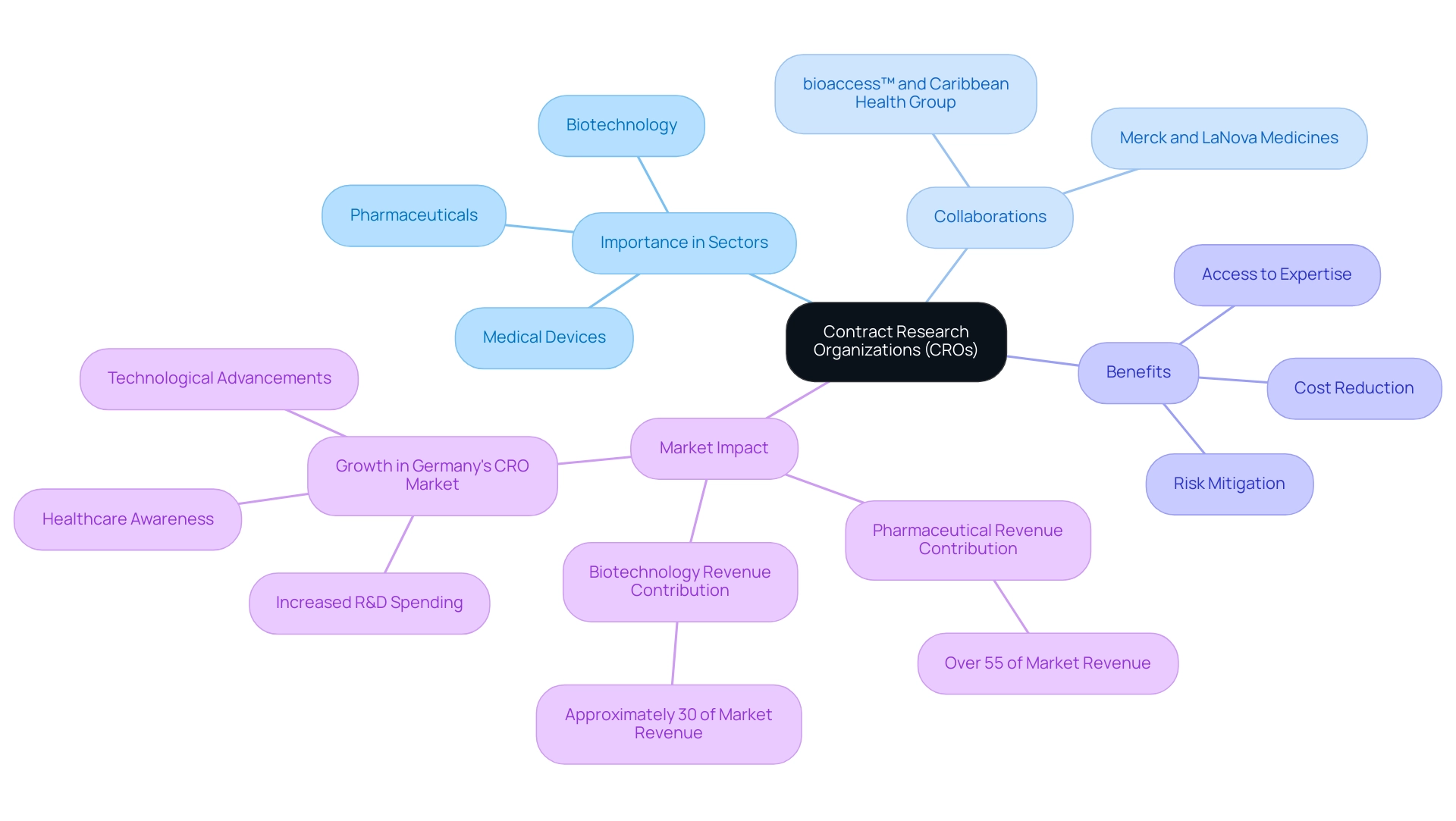
Key Services Provided by CROs in Clinical Research
Contract Research Organizations (CROs) play a pivotal role in supporting the clinical research landscape by offering a diverse range of essential services, which include:
- Comprehensive Clinical Study Management Services: At bioaccess®, we specialize in feasibility studies, site selection, compliance reviews, study setup, import permits, project management, and reporting. Our expertise guarantees that every element of medical research is carefully overseen to adhere to regulatory standards while achieving scientific goals. We help in the selection of research locations and principal investigators (PIs), ensuring studies are established efficiently and ethically approved.
- Site Management: These organizations excel in identifying, selecting, and managing clinical research locations. This process is vital for maintaining protocol adherence and ensuring regulatory compliance throughout the study lifecycle, particularly through effective project management and monitoring.
- Patient Recruitment and Retention: Effective strategies for recruiting and retaining study participants are essential for research success. Biotech contract research organizations implement targeted recruitment strategies, leveraging data from recent surveys that indicate up to 80% of internet users search for health information online, thus tapping into digital platforms for enhanced recruitment efforts. Anisimov noted, "The country recruitment process could be well-approximated by a PG process with some aggregated parameters," emphasizing the importance of structured recruitment methodologies.
- Data Management and Biostatistics: A biotech contract research organization is responsible for the meticulous collection, management, and analysis of research data. This ensures that the integrity and accuracy of results are maintained, which is crucial for regulatory submissions and scientific credibility. A recent Kruskal-Wallis test showed a significant difference between the medians of each algorithm’s solutions (p-value < 0.001), highlighting the importance of robust data management practices.
- Regulatory Affairs: Navigating the complex regulatory landscape is another key service offered by our biotech contract research organization. They ensure that studies comply with both local and international guidelines, facilitating smoother approvals and study conduct. At bioaccess®, we prioritize compliance reviews on study documents to align with country requirements, ensuring all necessary permits are obtained for investigational devices. Furthermore, we oversee the import permit procedure and the nationalization of investigational devices, which are essential for successful execution.
The importance of these services cannot be exaggerated, especially in light of the growing complexity and expenses related to medical studies. As highlighted in a recent analysis titled "Tradeoff Analysis Between Pos and Cost," the tradeoff between probability of success (Pos) and costs illustrates how strategic planning in these areas can lead to more efficient and cost-effective recruitment strategies. The analysis reveals that as Pos requirements increased, total costs also rose, with the lowest cost recruitment plan at 0% Pos being $12.4 million and at 90% Pos being $13.4 million.
These findings highlight the significance of various simulations to determine cost-efficient recruitment strategies, ultimately affecting the overall success of medical studies. Moreover, the influence of Medtech research extends beyond the studies themselves, aiding local economies through job creation, economic growth, and enhanced healthcare results.
Furthermore, bioaccess® is dedicated to guaranteeing the safety of all data handled during medical evaluations. We implement reasonable security measures to prevent the loss, misuse, or unauthorized alteration of sensitive data, acknowledging the inherent risks while striving to protect client information.
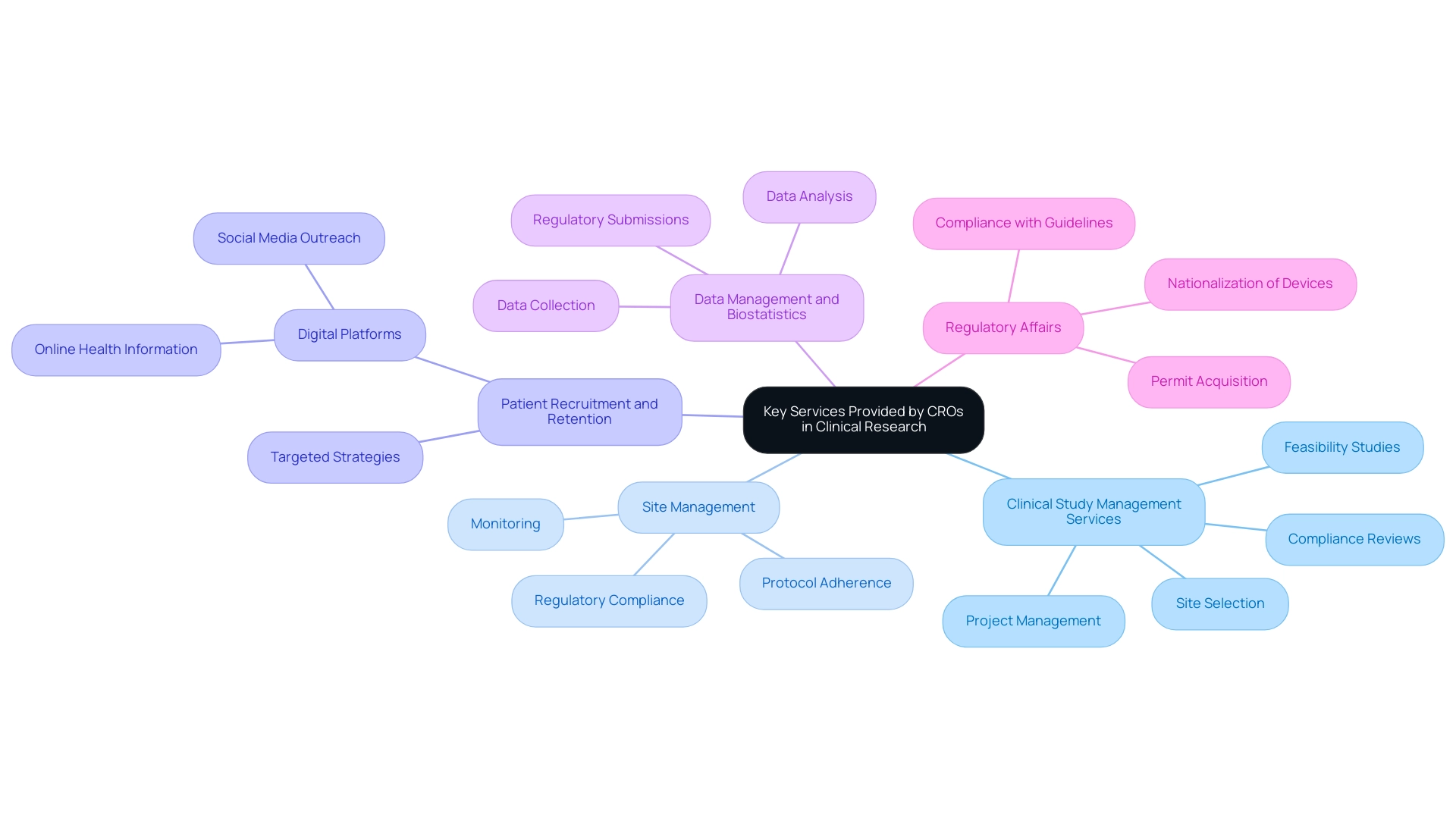
The Role of Technology and AI in Modern CROs
Contemporary Contract Research Entities are increasingly utilizing technology and artificial intelligence to enhance research processes, offering extensive trial management services that encompass feasibility studies, site selection, compliance reviews, trial setup, import permits, project management, and reporting. This integration of advanced tools is transforming operations and enhancing efficiency across various dimensions. Key roles of technology in CROs include:
-
Data Analytics: The application of advanced analytics allows researchers to efficiently process and interpret large datasets.
This capability not only accelerates insight generation but also enhances decision-making, leading to more informed outcomes in clinical trials. -
Electronic Data Capture (EDC): The adoption of EDC systems has revolutionized data collection methods. By minimizing manual input, these systems reduce errors and improve data accessibility, ultimately streamlining the research process. Recent trends indicate a growing adoption rate of EDC systems among biotech contract research organizations, reinforcing their role in enhancing operational efficiency.
-
AI and Machine Learning: AI is being leveraged for predictive analytics, particularly in patient recruitment and monitoring study progress. This proactive approach enables CROs to identify potential issues before they escalate, thereby enhancing overall study efficiency. As highlighted in recent data, 18 out of 52 experiments reported a significant decrease in operational time due to AI-driven enhancements. However, it is important to acknowledge the limitations of current research, such as the language restriction to English-only studies and the lack of updated trends in study risk of bias, which may affect the comprehensiveness of these findings.
-
Telehealth Solutions: The integration of telehealth technologies facilitates remote patient monitoring, ensuring compliance while alleviating the burden on participants. This shift towards virtual interactions responds to evolving participant needs and regulatory landscapes. Looking ahead, AI is anticipated to enhance study design, lessen participant burden, and speed up data reconciliation in research studies over the next five years, indicating a promising future for medical investigation.
The impact of these comprehensive services extends beyond the medical setting, contributing to local economies through job creation, economic growth, and healthcare improvement. In addition to these services, a biotech contract research organization provides essential review and feedback on study documents to ensure compliance with country requirements, set up and obtain approvals from ethics committees and health ministries, and report on study status and adverse events. In the words of research expert Meri Beckwith,
While there’s plenty of hype around AI, we’re seeing tangible applications in studies that enhance efficiency and accessibility.
These advancements emphasize a crucial transformation in how CROs function and point out the necessity for additional exploration on AI applications in trial recruitment and retention, suggesting a promising future propelled by innovative technologies.
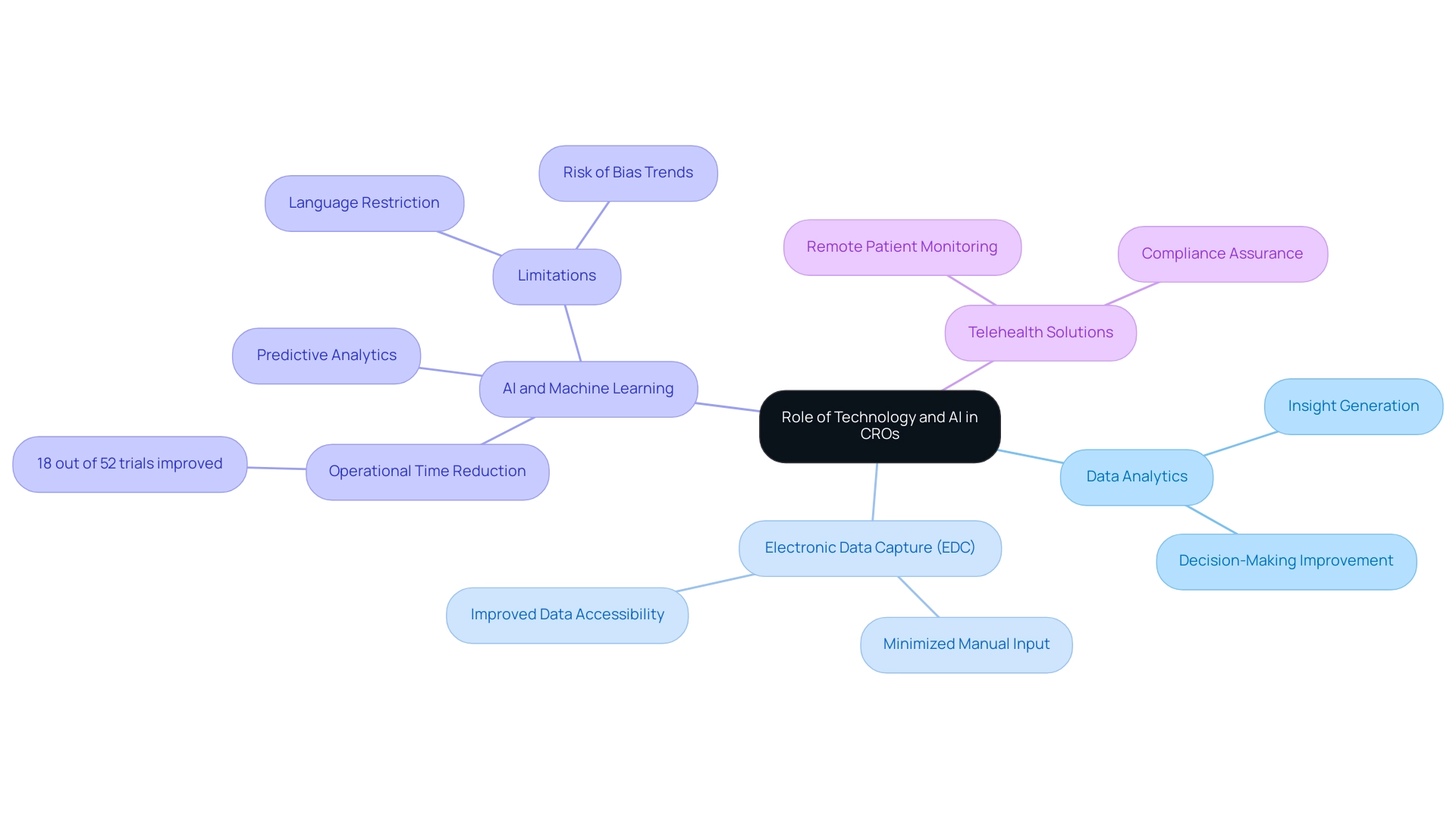
How to Choose the Right CRO for Your Research Needs
Choosing the appropriate biotech contract research organization (CRO) is a crucial choice that can greatly influence the success of clinical studies. With only 39.6% of businesses having a documented CRO strategy, making informed decisions is more important than ever. Here are key factors to consider:
-
Expertise and Experience: Assess the CRO's history in your specific therapeutic area and the stage of study you are undertaking. A CRO with a proven history in your field brings valuable insights and innovative approaches to your project.
-
Comprehensive Clinical Trial Management Services: Look for CROs that offer a full suite of services, including feasibility studies, site selection, compliance reviews, trial setup, import permits, nationalization of investigational devices, and project management. For instance, the ability to navigate import permits and ensure adherence to local regulations can streamline your study's progress.
-
Regulatory Compliance: Given the stringent nature of medical studies, ensuring that the CRO maintains a strong reputation for adhering to regulatory standards is essential. Organizations with a history of successful audits and compliance can mitigate risks associated with regulatory scrutiny. For example, understanding the role of INVIMA as a Level 4 health authority in Colombia enhances the importance of local compliance.
-
Communication and Collaboration: The effectiveness of a CRO often hinges on its communication style. Assess how the CRO approaches collaboration and whether it aligns with your project management preferences. A transparent and responsive communication strategy fosters a productive partnership.
-
Technology Capabilities: In today's data-driven environment, the technology platforms utilized by a CRO are crucial. Investigate their capabilities in data management and patient engagement, as advanced technology can enhance efficiency and accuracy throughout the study.
-
Cost and Budget: Understanding the CRO's pricing model is vital to ensure it fits within your project's financial constraints. While budget considerations are important, it is equally crucial to avoid compromising on quality. An investment in a reputable CRO can yield significant returns in study outcomes.
In light of recent market trends, such as the UK's leading position in the healthcare CRO market driven by rising demand for outsourcing services and advancements in biotechnology, understanding the dynamics of a biotech contract research organization can influence your selection. Furthermore, as noted by PharmaLex GMBH, "the opening of our new office in China and Beijing in September 2022 reflects our commitment to addressing the evolving needs of the global market." By considering these factors, including the importance of detailed reporting on study status, inventory, and serious and non-serious adverse events, you can navigate the complexities of CRO selection and forge successful partnerships that advance research initiatives, ultimately contributing to job creation, economic growth, and healthcare improvement.
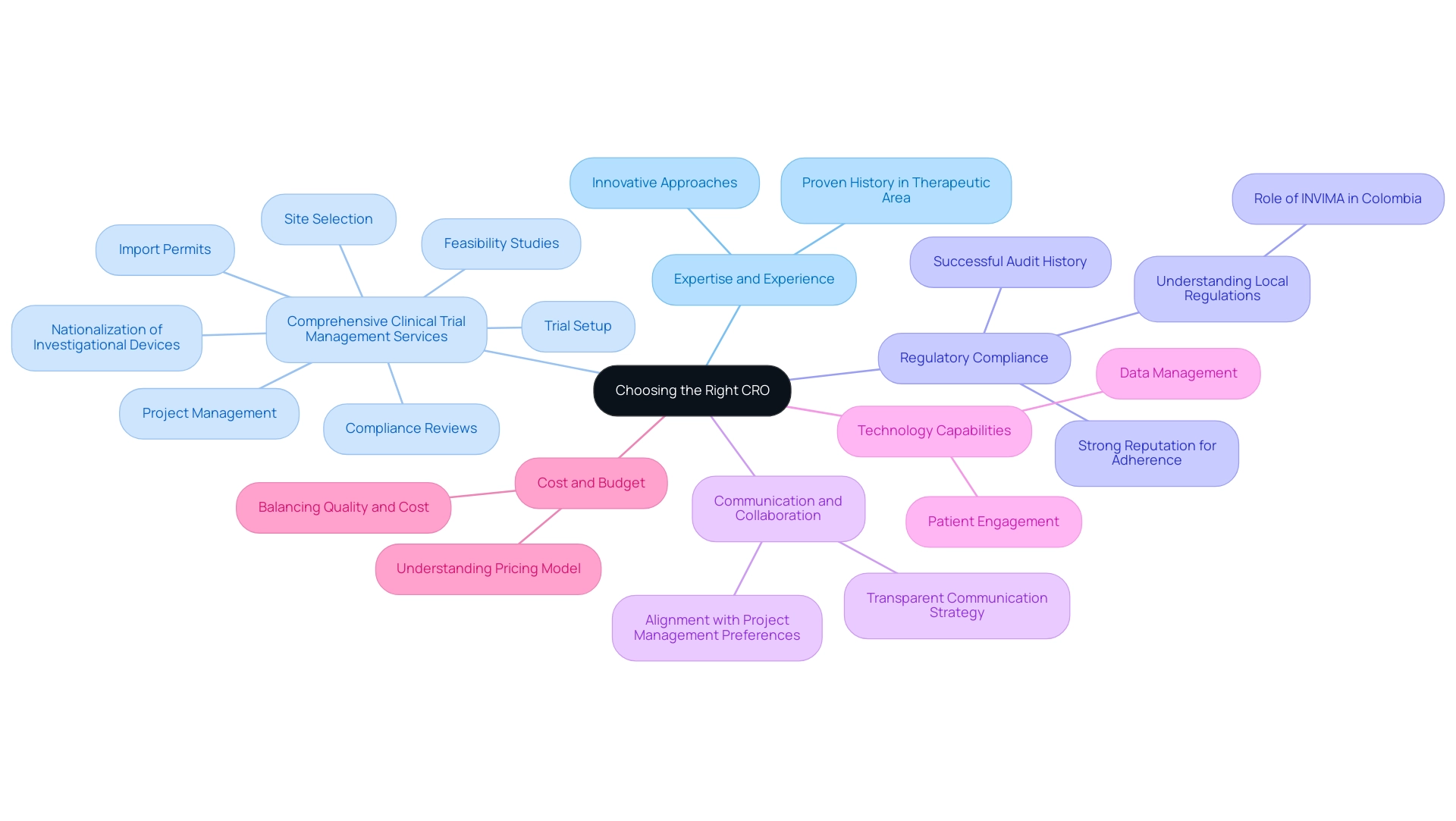
Common Challenges in Collaborating with CROs and How to Overcome Them
Working together with a biotech contract research organization poses numerous obstacles that can greatly influence project results, especially for medical device startups managing first-in-human studies in Colombia. Here are some of the most common issues and strategies to address them:
-
Communication Gaps: Regular meetings and updates are crucial to ensure all parties remain aligned on project goals and expectations.
Clear communication pathways can mitigate misunderstandings and foster collaboration, especially when operationalizing comprehensive services like study design, investigator selection, and regulatory submissions. -
Recruitment Issues: Effective recruitment strategies are vital for the success of clinical trials. Collaborating closely with the CRO to develop robust recruitment plans and maintaining flexibility in timelines can enhance patient enrollment.
For example, GlobalCare Clinical Trials' partnership with bioaccess™ has achieved over a 50% reduction in recruitment time and 95% retention rates, showcasing the importance of strategic recruitment efforts. -
Compliance and Regulatory Challenges: It is essential to establish clear guidelines and conduct regular compliance checks throughout the study. This proactive approach can help in navigating the complex regulatory landscape.
As noted by Alexander Fanaroff, M.D., Aros have worked with the FDA to improve research data quality, underscoring the importance of compliance in collaborations with a biotech contract research organization. In Colombia, the submission of study protocols to the Ministry of Health (INVIMA) and the ethics committee reflects these critical regulatory processes. A biotech contract research organization also plays a crucial role in ensuring that all necessary documentation is prepared and submitted for regulatory approval, including the ethics committee's requirements and INVIMA's guidelines. -
Cultural Differences: Embracing an inclusive environment that respects diverse work cultures and practices can significantly enhance collaboration. Comprehending and appreciating these distinctions promotes a more unified working relationship, especially in a multicultural environment such as Colombia, where initiatives are backed by local authorities to establish Barranquilla as a prominent destination for medical studies in Latin America. The partnership between bioaccess™ and Caribbean Health Group, along with support from Colombia's Minister of Health, aims to create a favorable environment for research trials in this region.
-
Budget Overruns: To prevent financial issues, it is important to set clear financial expectations upfront and maintain transparency throughout the project. This approach not only manages budgetary constraints but also builds trust between parties. The collaboration between bioaccess™ and Caribbean Health Group exemplifies a strategic investment in clinical research, aiming to streamline operations and reduce overall costs.
As the landscape of clinical research continues to evolve, the integration of digital tools is expected to further streamline communication and recruitment strategies, enhancing data collection and reducing costs.
Organizations that effectively address these common challenges while providing comprehensive services, including study design and compliance management, will be better positioned for success in an increasingly competitive market.
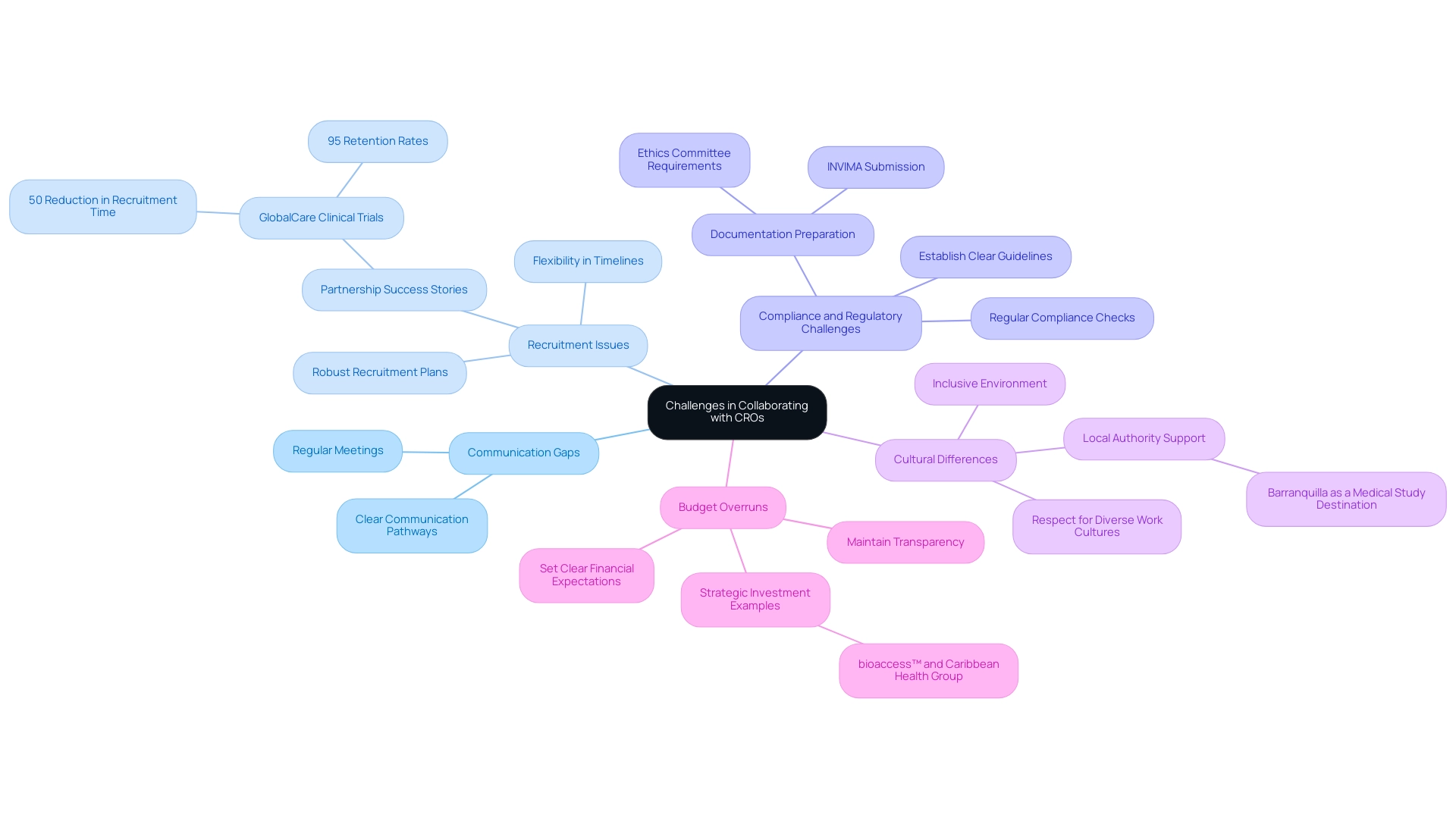
Future Trends and Market Dynamics in the CRO Landscape
The landscape of Contract Research Organizations is undergoing significant transformation, influenced by several pivotal trends:
- Increased Focus on Patient-Centric Approaches: CROs are increasingly embracing strategies that prioritize patient engagement and experience, which is crucial for enhancing recruitment and retention rates. Studies suggest that as of 2024, a significant rise in patient-focused approaches will be crucial for study success, demonstrating a change in how health investigations are performed. According to research by Stansbury et al., prior to the pandemic, 47% of ongoing 2019 studies implemented at least one Risk-Based Quality Management (RBQM) component; by comparison, 77% of reported 2020 studies leveraged at least one RBQM component, highlighting the growing emphasis on quality management in study design. These methodologies are frequently utilized through extensive services like feasibility studies and compliance reviews, ensuring that studies are designed with patient needs in mind.
- Growth of Decentralized Studies: The rise of decentralized research studies, characterized by remote monitoring and telehealth solutions, is reshaping conventional study models. This evolution not only enhances accessibility for participants but also aligns with patient preferences for mobile-first technologies that facilitate online screening, enrollment, and data sharing. Such innovations can significantly reduce clinician workloads while improving patient involvement. The recent acquisition of a Pfizer drug in an $11 billion buyout underscores the financial investments being made in addressing unmet medical needs, reflecting the industry's evolution towards more patient-focused approaches.
- Integration of Real-World Evidence: There is a growing acknowledgment of the significance of real-world data in shaping study designs and informing regulatory submissions. By utilizing real-world evidence and extensive services such as feasibility studies, site selection, compliance assessments, study setup, import permits, and project management, a biotech contract research organization can enhance the relevance of its findings and better meet regulatory expectations, ultimately improving the overall quality of clinical research. Additionally, effective reporting processes, including study status updates and inventory management, are critical in ensuring transparency and compliance throughout the trial.
- Sustainability Initiatives: As environmental concerns gain prominence, biotech contract research organizations are increasingly integrating sustainable practices into their operations. This commitment not only addresses societal expectations but also enhances the operational efficiency of trials, thus attracting stakeholders who prioritize sustainability.
- Collaborative Ecosystems: The trend towards partnerships among CROs, technology providers, and academic institutions is fostering an environment of innovation. Collaborative ecosystems are essential for sharing knowledge and resources, which can lead to enhanced outcomes and a more effective response to emerging medical needs. For example, a recent search uncovered nearly 200 registered trials focusing on psychedelics, driven by increasing evidence indicating their potential to treat central nervous system (CNS) disorders. This case study illustrates how biotech contract research organizations are integrating innovative treatments into their operations, aligning with patient-centric approaches and addressing significant medical challenges.
These trends signify a dynamic shift in the industry, driven by a commitment to enhance patient experiences, improve operational efficiencies, and address contemporary challenges in clinical research. The emphasis on comprehensive services, including reporting on serious and non-serious adverse events and the nationalization of investigational devices, underscores the CRO's role in advancing global health improvement.
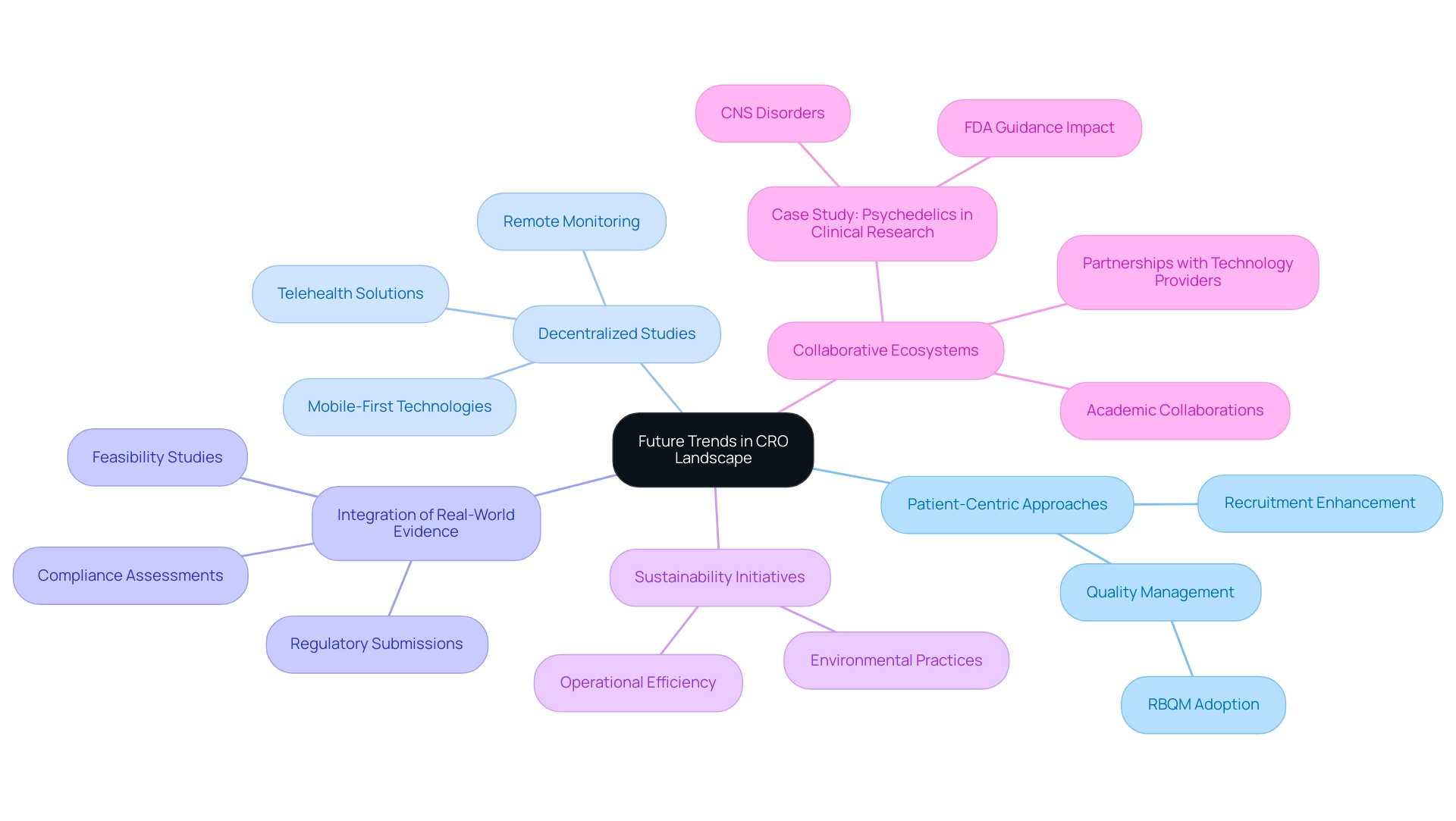
Conclusion
The role of Contract Research Organizations (CROs) in clinical research is increasingly critical as they provide essential services that enhance the efficiency and effectiveness of clinical trials. By offering comprehensive management services, adept site management, and innovative patient recruitment strategies, CROs empower sponsors to focus on their core objectives while ensuring compliance and quality outcomes. The integration of advanced technologies, including data analytics and artificial intelligence, further optimizes these processes, allowing for more informed decision-making and streamlined operations.
As the landscape of clinical research continues to evolve, selecting the right CRO becomes paramount. Key considerations such as:
- Expertise
- Regulatory compliance
- Technological capabilities
- Effective communication
can significantly influence project success. Addressing common challenges—such as communication gaps, recruitment issues, and budget constraints—requires a proactive approach and a commitment to collaboration between sponsors and CROs.
Looking ahead, emerging trends such as:
- Patient-centric methodologies
- Decentralized trials
- Sustainability initiatives
are shaping the future of CRO collaborations. These developments not only enhance participant engagement but also align with broader industry goals of improving healthcare outcomes. By understanding these dynamics and leveraging the strengths of CROs, stakeholders can navigate the complexities of clinical trials more effectively, ultimately contributing to advancements in medical research and global health.




